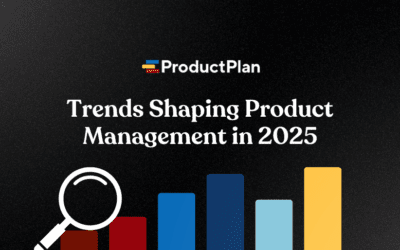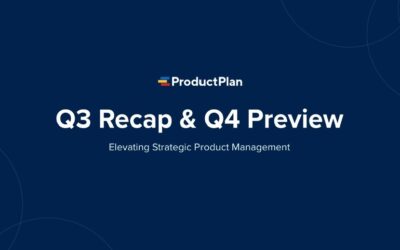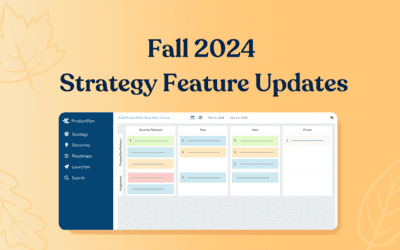Every hire is essential, but a new product leader’s impact ranges far beyond their contributions. They’ll have a major influence on their team, which affects the colleagues they interact with the most. While also having a significant impact on corporate goals, priorities, and tactics. Before hiring a product leader, you need to ensure that you understand the most essential product leadership interview questions that can help better inform your hiring decision.
It’s like when you hire a new head coach. They bring in some of their assistants, put individual contributors into new roles, and utilize their terminology and playbook, giving them an outsized effect on the entire organization.
If you’ve done it right, a new product leader will make you a little uncomfortable. They bring in some diverse opinions and the stature to share and back those up. Additionally, they’ll probably have a skill set that makes you a little insecure about your resume.
Though you may feel insecure about a new product leader in the long term, the new hire will contribute to your product team. Ultimately, this uneasiness is what leads to growth and positive change. However, new product leaders do still need to fit in a little bit. Unless you genuinely want to rock the boat and shake things up in a big way.
What Experience to Look for When Interviewing
Before you ever hop on the phone or a Zoom or meet in person with a candidate, you’ll already know plenty about their experience. There might be some career rehashing as part of the interviewing process. But they didn’t make it this far if their resume wasn’t a pretty good match for your needs.
So instead of fixating on their work history, get a feel for what makes them tick—your candidate’s motivations matter. You want to know what they like most and least about working in product to understand their passions and preferences.
“Product” roles vary so much from one company to the next. Make sure their skills and interests align with what your organization needs from them. It’s also crucial that they’re excited about addressing your customer base’s specific challenges and needs.
Understand How They’ll Fit with The Team
Envision what hiring them would mean for their team. Does the candidate address the underlying needs, and will they help the team grow?
Soft skills are the other area that can’t be explored by simply looking at their LinkedIn profile. You can teach some product management fundamentals and train them on tools and processes—but you can’t teach curiosity and passion.
You’re looking for examples of how they’ve used their passion for a product to get things done in challenging environments, built consensus, and delighted customers. You want specifics about how they’ve overcome obstacles and expanded their knowledge. Learning about the meaningful impacts on the lives of their users are the “juicy bits” you’re looking to extract from your time together.
Not Every Product Manager Should Be (or Wants to Be) a People Manager
Good salespeople often make terrible sales managers because the skills that help you close a deal are entirely different from those that help you motivate your staff. While there’s a little more overlap on the product side, the same dynamic is also in play. Someone who loves immersing themselves in the details of their specific domain may not have the mental and emotional skills to add value across multiple products and product staff at a higher level.
With this in mind, it’s important to remember that people can climb the corporate ladder without necessarily taking on people management duties. Paying attention to how candidates answer some of your questions can help you steer them into the more appropriate track.
Some people thrive on identifying problems, connecting with customers, and getting into the weeds to find new opportunities. These folks are best suited for individual contributor roles. They will likely find people management responsibilities unfulfilling even if they think that’s the job they need to advance their career.
Others thrive on amplifying their impact. While they’re still passionate about solving customer problems, they’re interested in building out skills and processes for the whole team. They’re able to trust others and delegate so they can focus on the big picture.
6 Product Leadership Interview Questions to Ask
In my experience, these are six of the most common questions that get asked. I’m also pointing out what you should pay attention to when they answer.
Question 1: Tell me a story.
The best way to prove someone’s storytelling chops is to ask them to tell you one. Crafting a compelling narrative is an essential tool in generating consensus and enthusiasm for ideas. Thus, you’ll want to see how they do.
I prefer a story describing an end-to-end production process and its results. So I’m looking for a few critical elements in their response:
- Verb selection: Did they “direct” or “collaborate”? Were they echoing the voice of the customer or just writing up product requirements? Is there some heart and emotion in their retelling? Or is it a simple regurgitation of the facts and events that transpired?
- Data: Do you think this was the right project for your team? How did they measure success? Product managers can’t always measure the success of a product. Many companies are lacking in this area, so I don’t blame them if it’s lacking. But I want to see at least some awareness of the value of using metrics and how they considered implementing them. Plus, I want to make sure they’re not just quoting proxy metrics with no apparent correlation to the customer or business goals, as that’s a warning sign as well.
- Expansiveness and inclusiveness: How insular are they? Are they considering other stakeholders, departments, and customers in their processes? Product leadership is about more than bossing around your direct reports. You must also establish and value strong relationships with folks across the organization.
Question 2: Which products do you love?
This question provides you a little peek behind the shiny veneer candidates who are cloaking themselves in during the interview process. An exact answer will reveal something about what matters to them and what draws their attention. Keep in mind that something vanilla and obvious signals a lack of depth and creativity.
Besides just getting to know them as a person, it’s also a glimpse of what they appreciate as product professionals. Do they gravitate to generic products they use every day? Or are they more enthusiastic for brilliant technical or design solutions to tough challenges?
Their mentioned solutions truly energize the ideal candidate. Saying products that ingeniously yet quickly improve the lives of their customers while boasting a solid business model is critical. You have another opportunity to evaluate their storytelling skills.
Question 3: A question about your product
They’ve seen the solution (the product they’re interviewing to work on), and now you want to know if they can identify the customer problem it’s solving. It’s time to flip the script and let them show off their product management skills.
It’s also a chance to see if they’ve done their homework and understand what you’re trying to do. I want to know that they not only understand the concept but that they get the actual application. If they weren’t curious enough to dig into the job they’re interviewing for, will the candidate go the extra mile to communicate with the team effectively?
Your product is a solution designed to address a customer challenge. How much of that customer problem could they intuit from the website or checking out the product itself?
We have an unfair advantage at ProductPlan since product managers are our actual customers. So there’s no excuse here if a candidate isn’t familiar with the customer problems we’re trying to solve. I’ll often ask them more pointed questions given that familiarity, such as probing into what additional value we could provide their product management team or what other opportunities and challenges lie ahead for us given their intimate understanding of the space.
Learn how to grow a successful product team:
Question 4: Describe your ideal workflow/relationship with User Experience and Engineering.
Though there are no correct answers, you may find that there are also many wrong ones. Instead, this question puts a spotlight on their penchant for collaboration.
Everyone comes to the table with their strengths—product understands the customer problem, UX lives to delight customers and creates frictionless user experiences. Engineering knows the technical boundaries and opportunities at hand. I want product leaders who recognize our collective strength lies in the sum of these parts. They’ll check their ego in the interest of jointly creating customer value.
I honestly don’t care which processes candidates bring up, as long as they are logical workflows that incorporate stakeholder alignment and goal-driven outcomes. Making everyone feel like they’re an essential partner in the process is in many ways more vital than the process itself.
What matters most here is breaking down silos, playing to people’s strengths to help them grow, and the flexibility to adapt to the situation at hand.
Question 5: How do you prioritize?
There are dozens and dozens of ways to tackle this task, and once again, I’m not seeking any particular framework or methodology. I’m using it as a lens to see how they process information from various sources and turn that into a coherent vision.
In particular, I’m always wary of candidates coming from places where it was a top-down, CEO-calls-all-the-shots vibe. That type of environment limits a PM to just executing things. I’m also not interested in someone when they’ve just bounced around priorities based on whatever their most extensive and newest customers demanded.
I’m looking for stakeholder alignment, rapid assessment of new developments, and (obviously) leaning on a solid roadmap to pull it all together. An objective element in the prioritization process (scoring, weighting, etc.) is also a big plus in their favor.
Question 6 – Show me your superpowers.
I rarely present an offer letter to a candidate that hasn’t illustrated how they work. While “test projects” have fallen out of favor, I still want to see their capabilities. To achieve this, I create scenarios to evaluate better how they’ll operate if they land the job. Time-box these so they don’t spin out into a lengthy assignment.
For example, I had a candidate with all the correct answers, yet they seemed more concerned about their own opinion than the necessary collaboration great products require. I created a scenario intentionally missing critical information. I was looking to see whether they asked questions or requested help instead of just barreling ahead without essential details.
Don’t be afraid to throw a curveball.
Throwing in a new piece of information halfway through a scenario is another excellent test of their mental agility. Product managers must deal with competitors launching out of the blue, unexpected customer requests, technical hurdles, and unanticipated market changes. How they adapt is a fantastic peek at their ability to remain strategic while remaining flexible in high-pressure situations.
Given the increasing number of remote teams—including our engineering team—not to mention the many companies that will remain remote until the last embers of COVID-19 die down, communication skills are at a premium. Navigating the communication styles and utilizing a product roadmap to ease communication amongst teams matters much more when everyone isn’t in the same room.
One scenario to test this is picking a near-term roadmap initiative and asking them to summarize who needs to be involved, when, and to what degree. A good barometer asks the potential new hire to pen a press release and an internal email.
While not everyone will be thrilled about any of these “tests,” you can explain that these exercises significantly shorten interview times. It would help if you let them do some of it asynchronously. And, if they have work samples that would convey the same aspects of their work style and output, you should welcome them.
Quality Over Quantity
Whether you incorporate all, some, or none of the above questions into your product leader interviewing process, I urge you to concentrate on fewer, higher-quality questions over a barrage of smaller ones. You’ll get more meaningful data on which to base your decision. Candidates will also get a better sense of the environment they would be entering if hired.




